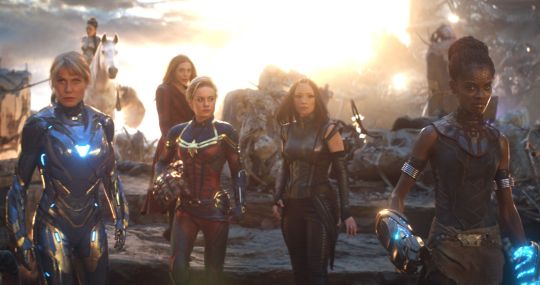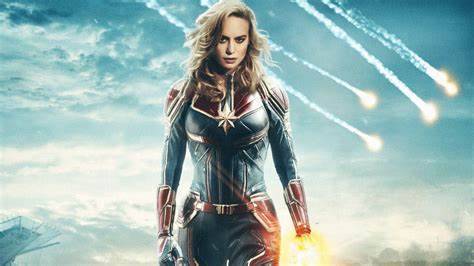Don't wanna be here? Send us removal request.
Text
If We Want to Change Representation of Women in the MCU, We Need Female Directors and writers who Can Adequately Portray Women's Thoughts , Feelings & Motivations... (Part 4)
In Part 4 of my blog investigation around the representation of women in the MCU, I decided to take a look at a video, posted by a female MCU fandom member. In this compelling short video, the author highlights the injustice towards female heroes in the MCU film, Endgame. She not only points out the obvious fact that there are very few female superheroes, but the ones that do show up do not fully embrace feminine qualities. For example, Captain Marvel, Gamora, Nebula and Valkyrie are all written as stoic characters. This shows how male writers don't understand the female brain and what makes the characters important. Carol Danvers specifically is seen by many to be unlikable due to not prioritizing an actress like Brie Larson and not giving her character attention. There are very few female heroes and most are reduced to just "the lady one" such as She-Hulk, Jane Foster's Thor, Kate Bishop's Hawkeye and Wasp. Although these ladies get some character moments, they really only have the same power set and abilities of their male counterparts. Even strong characters like Jane Foster's Thor and Wasp are reduced to love interests because the writers don't know what to do with the female characters. Although it is good that we are getting more female characters in the MCU, sometimes less is more and I believe women and men would appreciate developing these women into three dimensional characters instead of leaving them in archetypes.
youtube
The above link connects to an article with similar viewpoints as those made by the Youtuber, Rosie. It highlights the damage of the MCU's leading ladies being sacrificed, sexualized and reduced to stereotypes around motherhood, love and vunerability.
0 notes
Text
Breaking Down the Scripts...A Closer Look at How the MCU Represents its Female Characters (Part 3)

One of the scholarly articles I was able to find on this topic conducted an interesting study through what they called, "a feminist film theory lens". The study focused on six female characters from the MCU and used such variables as, "dialogue, costume design, and character relationships" Whenever these items came up in script or dialogue, notes were taken for later analysis. The thorough research of the author yielded results that showed (beyond the shadow of a doubt) that directors of the MCU films sexualize women characters by such tactics as clothing designs, dialogue and love interests (interactions with male characters).
There is no doubt that some of the female characters are written strong, but that is not enough. While efforts are being made to add more females to the MCU's lineup of leading superheroes, and progress can definitely be seen in such films as the recently released Wakanda Forever, we need to see more progress, and quicker! After witnessing the blatant marginalization of women in the MCU, we do not want history to repeat itself to once again ever display the outdated and harmful patriarchal frameworks or detrimental stereotypes of women in the MCU franchise or any other.
0 notes
Text
MCU's First Female Superhero (Part 2)
Let's Start at the Very Beginning...

To explore the topic of women to men ratios in the MCU, I first looked at some statistics (which were hard to dispute *see Part 1), but I also wanted to take a deep dive into the ways in which female superheroes were being portrayed. Logically, I started at the MCU's timeline for production (rather than comic backstories). The Black Widow was the MCU's first actual female superhero. The character was first seen on screen, and made her debut during the the popular Iron Man II movie where she was introduced as Black Widow in 2010. While the back story of Natasha Romanoff, along with her skills prove her to be a super badass, she is outfitted in an over-sexualized way, often wearing skin tight black leather cat-suit-type outfit, with glossy lips, and the zipper open at the top of her suit. When we as an audience first meet Black Widow, Iron Man is solely interested in her looks and the revelation that she is a serious spy only comes in later. In an interesting interview with Johansson (click link below), she opens up about her dislike at being "overly hypersexualized in Iron Man 2" (see link to full article below)
Click on the video below to see an example of the over sexualized stereotype that Black Widow is reduced to in this scene in Iron Man
youtube
And it wasn't just Iron Man 2...
In the first Avengers movie, director Joss Whedon sexualized Widow by focusing the camera on her backside and marketing her like a sex symbol to appeal to the male audience. Although Widow does get cool action scenes in the film, her being eye candy is apparent. It gets worse however in the sequel to Avengers, Age of Ultron. Reprising his role as director, Joss Whedon makes Black Widow less of a cool spy with a troubled past and treats her like a woman in need of saving. Whedon forced Black Widow to be in a romance with the Hulk even though many fans felt that they shared zero chemistry-it just served to portray her as a woman in need of saving on the team of godly superheroes (instead of being a femme fatale fully capable of taking care of herself).
Throughout the film she is also reduced to a stereotypical woman who is constantly talking about kids and how upset she is she can’t have them. To add insult to injury, in the film the main male antagonist Ultron, kidnaps Black Widow. This directly places Natasha in the “damsel in distress” trope even though anyone on the Avengers could’ve been captured instead to avoid the stereotype.
The Avengers just don’t go into the final battle with the intent of stopping Ultron, but that they also must save Black Widow. This trope for fictional women is extremely problematic especially for a character like Black Widow who is more than capable of taking care of herself and marketed as a badass.
In later films, Black Widow continued to appear as a background character in the ensemble only coming in when the plot needed her. Her appearances in Captain America: The Winter Soldier, Captain America: Civil War, Avengers: Infinity War and Avengers: Endgame prioritize Black Widow as a superhero spy that empowers women and who in Avengers Endgame, even makes the ultimate sacrifice by trading her own life for her fellow Avenger and friend Hawkeye.
Black Widow cemented herself as not just a great character for women as the target audience but also men. Black Widow was now a universally beloved character and people were so excited for her long-awaited solo movie. However, the film went through hell. The film was scheduled to release in 2020 but due to COVID-19, the world was put on hold. When the film came out, it was met with mixed reviews. People thought that Marvel went back to objectifying Natasha even though the film was directed by a woman. Others thought Natasha also felt like a side character in her own film due to Marvel wanting to introduce Florence Pugh’s Yelena Belova.
0 notes
Text
Researching the Claim... (Part 1)

In 2019, just two years ago, the following claim was made in a research paper (see link below)
“The Marvel Cinematic Universe has a huge media presence, and thus greatly influences fans of the genre. The stated issues clearly show that Marvel does not give equal representation and portrayal to its female characters compared to its male characters. This is damaging to women everywhere as well as fans of the genre who are subjected to this inequality. Although Marvel has made an effort to show more representation of female Superheroes in the Marvel Cinematic Universe, it has a long way to go before it reaches true equal portrayal of both genders within its movies”. - Jess Ameter
As someone who frequently reads material on the MCU in various forums, this debate has been controversial for a long time among loyal fans. Without doubt the blockbuster MCU movies of my childhood and early adulthood showcased such well known, blockbuster heroes as Ant Man, Thor, Captain America, Iron Man and other strong, male heroes showcased for their brains, strength and superpowers. In researching Ms. Ameter's claim, I did a bit of research of my own to focus on the credibility of her claim that women have not been given equal representation and have been portrayed in far less respectful ways than males of the MCU. While there is the obvious numbers game to consider (actual ratio of men to women), the issue is far more complicated than that because, for example, if you consider the strength, power and dignity of character used to craft Captain Marvel, (a female superhero) it makes her is ten times more apt to be successful than many of the less powerful male superheroes in the MCU.
FUN FACT: Captain Marvel was also a classic comic dating back to 1939 a time in which women were seen as domestic housewives, and men dominated the workforce, but, still, given all of these variables, Captain Marvel was a boss! Brie Larson played her in all of her glory in 2019 on the big screen.

click above to view an article that explores how women are portrayed in the MCU...
The above article offers some hope for the future of the MCU franchise (which IS headed in the right direction). There is also a highlight placed on characters like Sara Lance who embodies intersectionality as a bi-sexual, woman superhero.
0 notes
Text

The Time of Women Heroes and Leads in the MCU (Introduction)
In this blog I'll be exploring representation of women in the MCU. Through coursework in Media Studies, we've talked a lot about representation and the ways in which media representation can impact or bring to light issues around intersectionality, serve to define beauty, and use comments and posts to spearhead movements around studio projects. This blog post will include but will not be limited to exploration of female heroes, representation of female characters (main or lead) in both television film, race of female characters, as well as how women of the MCU are treated, outfitted (costumes), depicted through dialogue and the types of physical characteristics/attributes they encompass. Change is happening in the MCU as evidenced by Captain Marvel, WandaVision, Black Widow and Eternals to name just a few. Women are being cast in more lead roles, and female director/producers are now being brought in by studios to direct and set the tone for these films. It's time to explore, the MCU's women in film!
While not entirely exclusive to the MCU, this article used the Bedchel Method to analyze female representation in superhero films (*The MCU is mentioned)
1 note
·
View note